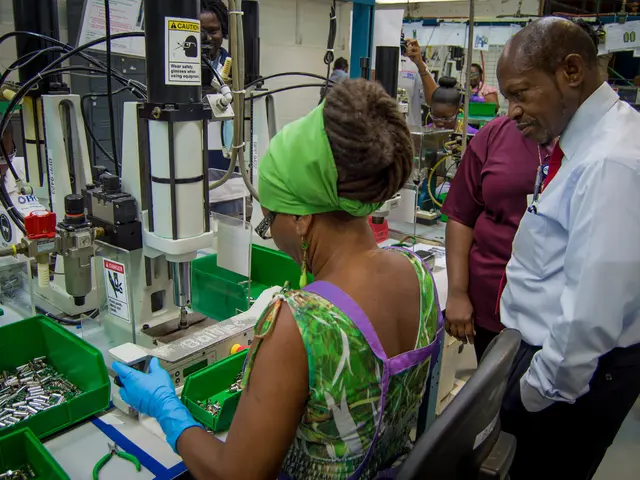Stirred Waters at REI: Union Disputes and Falling Reputation
Unionization Wave and Grievances
REI Denies Union Accusations, Potentially Damaging Its Progressive Image
Employees at REI, a prominent outdoor goods cooperative, have been increasingly organizing under the United Food and Commercial Workers International Union (UFCW) and the Retail, Wholesale and Department Store Union (RWDSU). As of early 2025, over ten REI stores across states like New York, California, Ohio, Illinois, Massachusetts, North Carolina, Washington, Minnesota, and Indiana have unionized. Among the key concerns are job security, competitive wages, consistent sick policies, guaranteed minimum hours, minimum staffing levels, healthcare benefits, parental leave, and adjustments to paid time off [1][3].
Bargaining and Unfair Labor Practices
Union representatives claim that the negotiation process for a first contract has been lengthy, with some negotiations dragging on for nearly two years at certain locations, such as the Soho store in New York. Employees have accused REI of bad faith bargaining and engaging in anti-union actions. Notably, after a change in legal representation, previously agreed-upon pay increases for unionized workers in New York were revoked [1]. In November 2024, unionized employees filed 80 unfair labor practice charges against REI, asserting that these and other anti-union acts have occurred [1].
Coordinated Actions and Elections
Workers have participated in coordinated protests and informational events to showcase their demands. The UFCW and RWDSU have urged REI members to vote against the current board in the Board of Directors election, criticizing the exclusion of pro-worker, pro-climate candidates from the ballot and the board’s oversight of leadership actions perceived as anti-union and anti-worker [3].
Threat to REI’s Progressive Image
REI has long positioned itself as a forward-thinking, employee-friendly cooperative. However, the recurring labor disputes, accusations of bad faith bargaining, and anti-union behavior have put the company’s progressive reputation to the test. The wide media coverage and coordinated union actions have led to scrutiny of REI’s internal practices and adherence to its publicized values [1][3].
Employee and Public Perception
Unionized workers at REI have expressed disappointment over the disparity between the company’s public commitments to progressive values and the actions during contract negotiations. The perceived lack of responsiveness from the company to union demands has resulted in internal dissent and criticism from advocacy groups, labor organizations, and even its member base [1][3].
Widespread Implications
These labor disputes have fueled a broader national dialogue surrounding labor rights in the retail sector, with REI serving as a case in point for underlying tensions between progressive branding and labor practices. The reputational risk is amplified by REI’s reliance on member loyalty and its stance as a leader in corporate social responsibility [1][3].
Key Points
| Issue | Description ||----------------------|---------------------------------------------------------------------------------------------|| Demands | Job security, minimum hours, sick policy, staffing, wages, healthcare, parental leave, PTO || Union Representation | UFCW (United Food and Commercial Workers), RWDSU (Retail, Wholesale and Department Store U.) || Number of Unionized Stores | Over ten (as of April 2025) || Allegations | Bad faith bargaining, anti-union behavior, unfair labor practices || Impact on Reputation | Undermines progressive image; internal dissent; public scrutiny |
- The labor movement within REI, a renowned outdoor goods cooperative, has been gaining momentum, with over ten of its stores unionized across various states by early 2025.
- Key concerns for these unionized employees include job security, competitive wages, sick policies, minimum staffing levels, and health benefits, among others.
- Union representatives have accused REI of engaging in bad faith bargaining and anti-union practices during contract negotiations, with some negotiations lasting up to two years in certain locations.
- These allegations have escalated, with unionized employees filing 80 unfair labor practice charges against REI in November 2024.
- Protests and informational events have been organized by employees to express their demands and criticize REI's actions, which workers perceive as a mismatch between the company's progressive values and labor practices.
- REI's ongoing labor disputes and accusations of anti-union behavior have led to public scrutiny of the company's internal practices and adherence to its stated values.
- The organizations UFCW and RWDSU have urged REI members to vote against the current board in the Board of Directors election, citing the exclusion of pro-worker, pro-climate candidates from the ballot.
- The unsettled labor landscape at REI and the resulting public backlash pose a significant risk to the company's reputation, particularly as a leader in corporate social responsibility and employee well-being within the retail industry.








